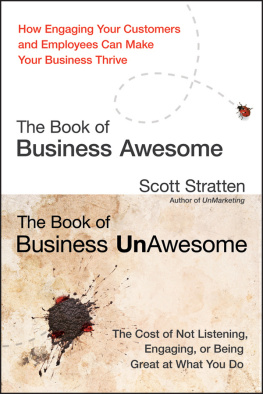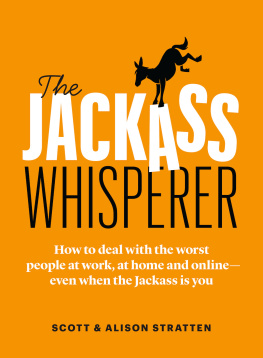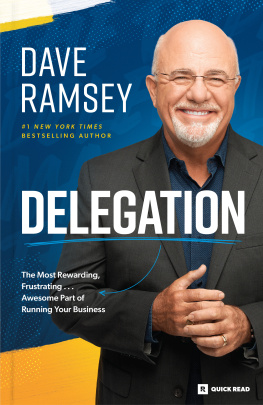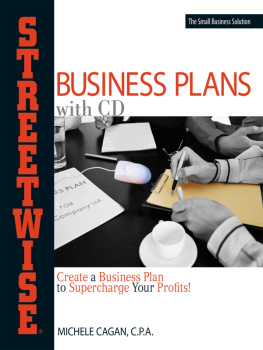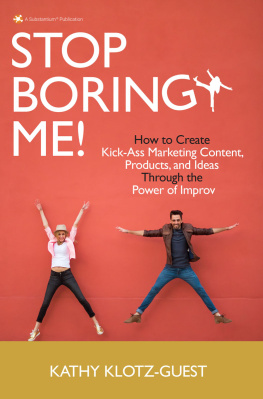Copyright 2012 by Scott Stratten. All rights reserved
Published by John Wiley & Sons, Inc., Hoboken, New Jersey.
Published simultaneously in Canada.
No part of this publication may be reproduced, stored in a retrieval system, or transmitted in any form or by any means, electronic, mechanical, photocopying, recording, scanning, or otherwise, except as permitted under Section 107 or 108 of the 1976 United States Copyright Act, without either the prior written permission of the Publisher, or authorization through payment of the appropriate per-copy fee to the Copyright Clearance Center, Inc., 222 Rosewood Drive, Danvers, MA 01923, (978) 750-8400, fax (978) 646-8600, or on the web at www.copyright.com. Requests to the Publisher for permission should be addressed to the Permissions Department, John Wiley & Sons, Inc., 111 River Street, Hoboken, NJ 07030, (201) 748-6011, fax (201) 748-6008, or online at http://www.wiley.com/go/permissions.
Limit of Liability/Disclaimer of Warranty: While the publisher and author have used their best efforts in preparing this book, they make no representations or warranties with respect to the accuracy or completeness of the contents of this book and specifically disclaim any implied warranties of merchantability or fitness for a particular purpose. No warranty may be created or extended by sales representatives or written sales materials. The advice and strategies contained herein may not be suitable for your situation. You should consult with a professional where appropriate. Neither the publisher nor author shall be liable for any loss of profit or any other commercial damages, including but not limited to special, incidental, consequential, or other damages.
For general information on our other products and services or for technical support, please contact our Customer Care Department within the United States at (800) 762-2974, outside the United States at (317) 572-3993 or fax (317) 572-4002.
Wiley publishes in a variety of print and electronic formats and by print-on-demand. Some material included with standard print versions of this book may not be included in e-books or in print-on-demand. If this book refers to media such as a CD or DVD that is not included in the version you purchased, you may download this material at http://booksupport.wiley.com. For more information about Wiley products, visit www.wiley.com.
Library of Congress Cataloging-in-Publication Data:
Stratten, Scott.
The Book of Business Awesome: How Engaging Your Customers and Employees Can Make
Your Business Thrive / Scott Stratten.
ISBN: 978-1-118-31522-4 (cloth)
ISBN: 978-1-118-31545-3 (ebk)
ISBN: 978-1-118-31546-0 (ebk)
ISBN: 978-1-118-31547-7 (ebk)
1. Relationship marketing. 2. Customer relations. 3. Management. I. Title.
HF5415.55
658.812dc23
2012010353
Awesome Acknowledgments
Inspired by Here's to the Misfits campaign for Apple.
Here's to the misfits.
The entrepreneurs. The lone wolves in companies. The ones who believe businesses are built on relationships, not interruptions. To the ones who realize social is what social media is all about.
To the brave souls who would never cold-call or mislead just to gain a dollar. To the business start-ups who build their companies on the belief alone that they can do it.
The ones who realize that to have an awesome business you have to be awesome yourself.
This book is for you.
Chapter 1
How One Man Changed a Billion-Dollar Brand
Every employee is your brand ambassador, your marketer, and the face of your company.
I was in Hartford at the Hilton Garden Inn, on stop number eight of my 30-city UnBook Tour to promote UnMarketing, Stop Marketing, Start Engaging. The tour was amazing, but it also meant that I was living on airplanes and in hotels.
I rolled out of bed and headed downstairs for breakfast around 9:45 am. Did I mention I'm not a morning person? It's actually one of the great problems I have in life: I love breakfast, and I hate mornings. The lobby had a breakfast buffet, and I'm not talking about the continental breakfast that most hotels throw in as a bonus with some Danish and something that resembles juice. This was a full spread of eggs, bacon, sausage, hash browns, cereal, bagels, you name it. I was pretty impressed with myself for being up in time for this feast, especially after crossing the continent the day before.
I told the chef that I'd like eggs, bacon, sausage, and hash browns (shut it, foodies); grabbed a juice; and took a seat. As soon as I sat down, I noticed they turned off the lights around the buffet. Score! I got there just in time.
Apparently not.
I dug in to my food, and it was bad. Old and cold. A bad combination for anything in life, let alone breakfast meats. I forced down some bacon, and after testing each of the other items, I couldn't continue. The waitress walked over with my bill and placed it on the table, without saying a word.
Most of the time in situations like these, what do we do? We take out our phones and share our bad experiences with the world, all the while quietly accepting them in real life. Most people would just allow this to happen and walk away, but I called her over. If I owned this business, I would want to know if something was up.
Hi, the food was really bad. It was cold and old.
She just looked at me, not knowing what to do, and mentally took out the customer service playbook and said the right thing.
I'll go get the manager.
And she walked away. I never asked for the manager or to have the bill taken care of. The manager came over and was nice and offered to have the chef make an omelet or something special for me. I declined, letting him know I really wasn't hungry anymore. I explained to him that I wasn't looking for a freebie but thought he needed to know. He picked up the bill and said they'd take care of it and apologized again.
This is where the customer service apology usually ends for 99.9 percent of businesses in the hospitality industry. Really, to be great at customer service, you need to be only mediocre, because everyone else sucks.
But not here.
The sous-chef, Forbes, ran out, stopped me from walking out, and looked shaken. Not in a shaken way like he'd been chewed out by anyone, but a sincere look of being upset. Did I mention he was about 6 foot 4 inches and 220 pounds? And that he ran at me? I have to admit, for a moment there, I regretted giving my feedback at all.
He caught up to me and said, Sir, I'm terribly sorry about your food this morning. A few thingsalthough not excuses, we didn't know until we were cleaning up that the water underneath the food trays that keeps everything warm was gone, hence the food was cold. And I also should have never given you the food that was sitting out that long; I could have made you something fresh right there, but I thought you looked like you were in a hurry. Regardless, I'm terribly sorry; this is not how we operate, and we'd like another chance to make it up to you.
Wow.
This guy gave a damn that a guest had a subpar experience and he needed to make it right. We can't stop screwups, only how we remedy them. And the solution usually isn't hard. Most people who complain just want to feel validated, able to walk away feeling that someone has heard and understood them.
I didn't threaten to tweet about it or use Do you know who I think I am? I was just another person staying at the hotel. He could have simply talked about how much of a moron I was to his coworkers or brushed it off by saying, You can't please everyone. He truly cared that they screwed up. He owned it. He changed my view of the Hilton Garden Inn and the Hilton overall. And he didn't have to.

